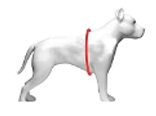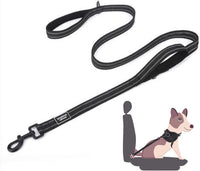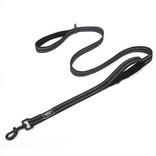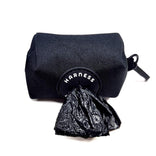Why Senior Dogs Need More Protein | What dog owners should know

Are you reading the fine print of the dog food you’re feeding to your furrever friend? There are a lot of dog foods on the market that are catered towards senior dogs, but according to a 2011 study by the Cummings School of Veterinary Medicine at Tufts University, researchers noted “that senior dog foods likely contained less fat, protein and sodium. Among the sample senior dog diets surveyed, these, too, varied widely (Protein 4.8 to 13.1 g/100 kcal, fat 2.4 to 6.3 g/100 kcal, sodium 33 to 412 mg/100 kcal).
‘If an owner, for example, had a senior dog with heart disease, they might be inclined to feed them a senior food, thinking that it had less sodium,’ says the study’s corresponding author, Lisa M. Freeman, DVM, PhD, a professor of clinical sciences at the Cummings School and a board-certified veterinary nutritionist. ‘Instead, they might replace a diet that had a perfectly acceptable amount of sodium for one that is considerably higher.’”
If there’s one thing that there’s a consensus on though, it’s that senior dogs need more protein than youthful or adult dogs so keeping an eye out on the protein value of those “senior dog foods” is important.

Why do senior dogs need more protein though?
According to WebMD, senior dogs benefit from higher amounts of protein because it “helps to maintain body weight and muscle mass without putting too much strain on the kidneys.”
The next big question is what are the sources of protein you can include in your dog’s diet?
Whole Eggs
Cost effective and packed with protein, whole eggs are a great option to go with because it is a highly digestible protein food. They also contain essential amino acids and fatty acids. Whole eggs also can help your dog if they have an upset stomach. You can mix fully cooked whole eggs into your dog’s food to make things tastier and up the protein value!
Chicken and Turkey
Chicken is a commonly known source of protein, but it does come with a set of precautions all dog owners should know about. What’s that? Chicken allergies are common with dogs. To avoid developing a chicken allergy, it’s recommended to switch up your dog’s primary source of protein every couple of months.

Fish
Fish options for dogs may include salmon, oceanfish, and other various fish types. They’re great for dogs as they have benefits that treat sensitive and/or dry skin. Just like chicken, however, there are precautions to keep in mind. Because of the chances of toxicity levels in fish, it’s important to rotate fish in and out of your dog’s diet as the main source of protein to avoid high levels of toxins.
Soy & Plant-Based Proteins
These proteins can be mixed into your dog’s food (lentils, legumes, potatoes, peas, etc.) but they cannot act alone as a source for your senior dog’s protein because these are proteins your dog otherwise wouldn’t encounter in a wild environment and yield lower protein levels compared to the aforementioned options.

If you’re shopping for dog food, make sure to keep a close eye on the ingredients and nutritional value on the packaging. If you find it difficult to find a solid amount of protein your senior dog needs, consider mixing in the above protein options into their food. Alternatively, you can consult your local, trusted veterinarian for options that best apply to your senior dog’s needs.
This is just a sampling of tips and informational posts we offer at Joyride Harness. You can find more content including tips and tricks and how-tos for caring for your dog on our blog at this section. Feel free to leave a comment with tips you’re looking for!




















